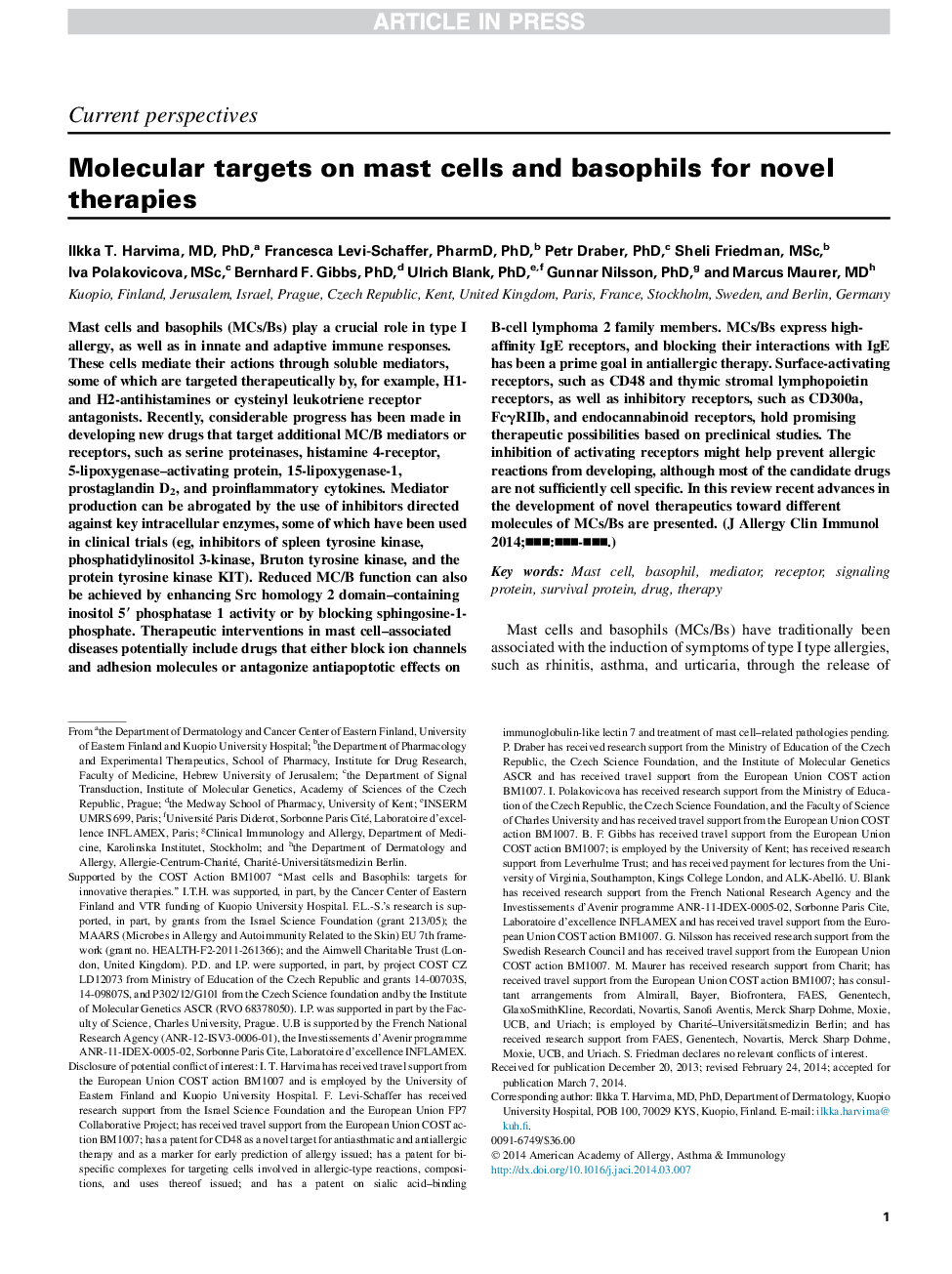| کد مقاله | کد نشریه | سال انتشار | مقاله انگلیسی | نسخه تمام متن |
|---|---|---|---|---|
| 6064603 | 1201863 | 2014 | 15 صفحه PDF | دانلود رایگان |
عنوان انگلیسی مقاله ISI
Molecular targets on mast cells and basophils for novel therapies
دانلود مقاله + سفارش ترجمه
دانلود مقاله ISI انگلیسی
رایگان برای ایرانیان
کلمات کلیدی
Thymic stromal lymphopoietin receptorCysLTRITIMCRACTSLPS1PSphK5-LOTSLPRPI3KBcl-215-lipoxygenase-1PGD2Trp5-Lipoxygenase–activating proteinMMP15-LO-15-Lipoxygenase - 5-لیپوکسیژنازBtk - BTKSphingosine kinase - اسپینوزین کینازSphingosine-1-phosphate - اسپینگسین-1-فسفاتbasophil - بازوفیلbasophils - بازوفیل هاFlap - برآافزا Bruton tyrosine kinase - بروتون تیروزین کینازSyk - بیمارDrug - داروTherapy - درمانSialic acid–binding immunoglobulin-like lectin - سیتال اسید، لکتین ایمونوگلوبولین مانندSiglec - سیگلکspleen tyrosine kinase - طرز تیروزین کینازPhosphatidylinositol 3-kinase - فسفاتیدیلینواستیل 3-کینازB-cell lymphoma 2 - لنفوم سلول B 2Thymic stromal lymphopoietin - لنفوپیتین استروما تیمیکLeukotriene - لکوترینmatrix metalloproteinase - ماتریکس متالوپروتئینازMast cell - ماستسلBcl-2 homology - همولوگ Bcl-2Mediator - واسطهtransient receptor potential - پتانسیل گیرنده گذراSignaling protein - پروتئین سیگنالینگProstaglandin D2 - پروستاگلاندین D2SHIP-1 - کشتی 1Receptor - گیرنده cysteinyl leukotriene receptor - گیرنده cysteinyl leukotriene
موضوعات مرتبط
علوم زیستی و بیوفناوری
ایمنی شناسی و میکروب شناسی
ایمونولوژی
پیش نمایش صفحه اول مقاله

چکیده انگلیسی
Mast cells and basophils (MCs/Bs) play a crucial role in type I allergy, as well as in innate and adaptive immune responses. These cells mediate their actions through soluble mediators, some of which are targeted therapeutically by, for example, H1- and H2-antihistamines or cysteinyl leukotriene receptor antagonists. Recently, considerable progress has been made in developing new drugs that target additional MC/B mediators or receptors, such as serine proteinases, histamine 4-receptor, 5-lipoxygenase-activating protein, 15-lipoxygenase-1, prostaglandin D2, and proinflammatory cytokines. Mediator production can be abrogated by the use of inhibitors directed against key intracellular enzymes, some of which have been used in clinical trials (eg, inhibitors of spleen tyrosine kinase, phosphatidylinositol 3-kinase, Bruton tyrosine kinase, and the protein tyrosine kinase KIT). Reduced MC/B function can also be achieved by enhancing Src homology 2 domain-containing inositol 5Ⲡphosphatase 1 activity or by blocking sphingosine-1-phosphate. Therapeutic interventions in mast cell-associated diseases potentially include drugs that either block ion channels and adhesion molecules or antagonize antiapoptotic effects on B-cell lymphoma 2 family members. MCs/Bs express high-affinity IgE receptors, and blocking their interactions with IgE has been a prime goal in antiallergic therapy. Surface-activating receptors, such as CD48 and thymic stromal lymphopoietin receptors, as well as inhibitory receptors, such as CD300a, FcγRIIb, and endocannabinoid receptors, hold promising therapeutic possibilities based on preclinical studies. The inhibition of activating receptors might help prevent allergic reactions from developing, although most of the candidate drugs are not sufficiently cell specific. In this review recent advances in the development of novel therapeutics toward different molecules of MCs/Bs are presented.
ناشر
Database: Elsevier - ScienceDirect (ساینس دایرکت)
Journal: Journal of Allergy and Clinical Immunology - Volume 134, Issue 3, September 2014, Pages 530-544
Journal: Journal of Allergy and Clinical Immunology - Volume 134, Issue 3, September 2014, Pages 530-544
نویسندگان
Ilkka T. MD, PhD, Francesca PharmD, PhD, Petr PhD, Sheli MSc, Iva MSc, Bernhard F. PhD, Ulrich PhD, Gunnar PhD, Marcus MD,